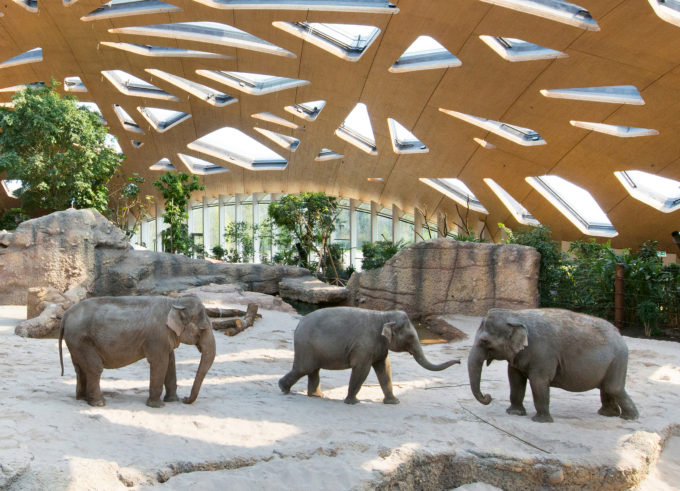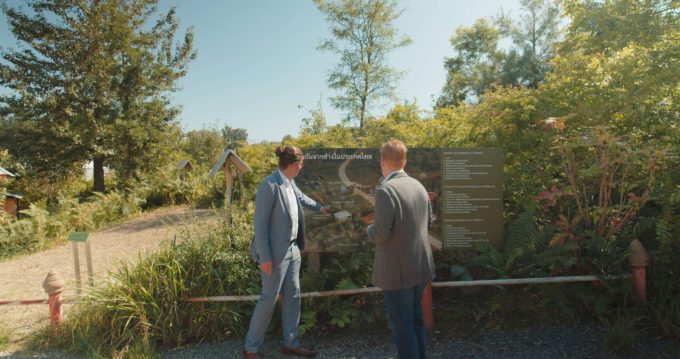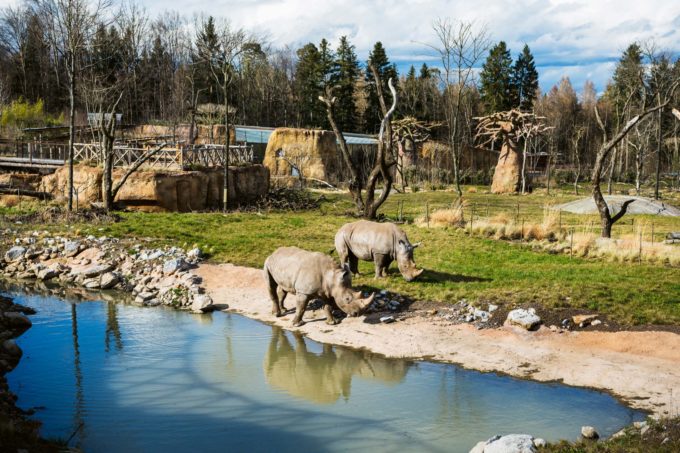Empathetic assertiveness: piloting tough negotiations
Negotiating in conflict zones or during a hostage crisis demands skill, courage, and emotional intelligence, all of which can transfer to the business world....
Audio available
September 14, 2021 • by David Bach in Magazine
Zurich Zoo director Severin Dressen explains how his organization is being proactive in tackling the loss of biodiversity and helping to shape a sustainable coexistence between humans and nature....
Thailand’s wild elephant population has been dramatically reduced from an estimated 300,000 at the start of the 20th century to fewer than 3,500 today. The root of the problem is the destruction of rainforests due to agricultural expansion, along with illegal logging, infrastructure development, urban sprawl and poaching. In Thailand, forest cover fell from 53.5% in 1961 to 31.6% in 2014.
The increase in the deforestation rate has been a catalyst for conflict between elephants and humans. Traditional migration routes often lead elephants through settled areas used for agriculture, and these moving giants can cause substantial damage to plantations, houses and cattle, sometimes even trampling farmers to death.
The community’s response can have tragic repercussions for elephants. “Elephants come overnight, they’re raiding the crops of the farmers, there’s not a very good reimbursement scheme, so farmers don’t know what to do, and they want to retaliate. So they’re poisoning or killing the elephant,” says Severin Dressen, the 33-year-old Director of Zurich Zoo.
The zoo in Zurich has made the mitigation of human-elephant conflict in Thailand a core part of its conservation work. It supports farmers in the construction of elephant-safe fences around Thailand’s Kaeng Krachan National Park, which is home to about 200 wild elephants. The fences set off an alarm that alerts farmers to encroaching elephants, so they can be frightened away with firecrackers before causing damage or being harmed.
Dr. Severin Dressen, Zurich Zoo director
Cologne, Germany, in 1988, and raised in Aachen.
Studied biology at the Humboldt University, Berlin, and at Imperial College, London. Doctorate in zoology at Oxford University.
Worked on assignments in animal care in Germany and Spain (Tierpark Berlin, Zoo Frankfurt, Loro Parque Tenerife, L’Oceanografic Valencia). Worked on conservation projects at El Palmar National Park in Argentina, among others.
After completing his doctorate, Dressen moved back to Germany to take up the position of curator at Wuppertal Zoo and, later, deputy director and zoological director. Since January 2020, he has been living in Zurich with his wife and two children.
“It's very simple, it's very cheap, but very effective. And it results in zero killings of elephants in the area,” says Dressen.

For him, such work addresses the elephant in the room: zoos are controversial. Zurich Zoo, located on the Zürichberg, in the city’s Fluntern quarter, houses 6.000 individuals over 27 hectares. Some people take a dim view of keeping free-ranging animals in captivity. Organizations such as Freedom for Animals, the new director of the Aspinall Foundation, and the Born Free Foundation are campaigning for zoos to one day be abolished.
However, Dressen sees the role of modern zoos changing as they take a more proactive role in tackling the loss of biodiversity, and helping to shape a sustainable coexistence between humans and nature. He points to their research into animals and their natural habitats, and conservation work, protecting endangered species through international breeding programs, and reintroducing animals raised or rehabilitated in captivity into the wild.
“Unfortunately, the number of species threatened by extinction is increasing,” he says. Zoos run reintroduction programs around the world, and Dressen warns: “If zoos didn’t exist, preserving these species, we wouldn’t have any individuals to reintroduce into the wild. So zoos, from a conservation point of view, are more necessary than ever.”
He also stresses their important educational role, most importantly linking the animals you see in a zoo to conservation, and creating employment or volunteering opportunities for the local community. “I’ve never worked in a zoo with such strong ties within society, it’s unbelievable,” Dressen says of Zurich Zoo. “You talk to people [and] they have this sensation of pride to have such a zoo basically within their city. I think that is really unique.”
Worldwide, it has been estimated that zoos attract more than 700 million visitors per year and spend around $350 million annually on wildlife conservation projects. Given the city of Zurich’s population of about 402,000 people, its zoo punches above its weight on a per capita basis compared with global peers. In 2019, visitor numbers at Zurich Zoo fell 4.6% to 1.25 million.
Dressen was appointed director in July 2020 after a multi-stage process with more than 140 applicants. He convinced the board with his strong professional track record and human values. But his appointment came at a time of crisis for zoos around the world. The pandemic lockdowns forced public attractions to shut their doors for a prolonged period. This caused major financial challenges for zoos that depend on a steady stream of visitors to fund their operations.
Zurich Zoo generates 88% of its operating income from visitors, with the remaining 12% coming from the city and canton of Zurich, which are both minority shareholders. The zoo’s daily operating costs amount to CHF 120,000 ($137,000), most of which is due to staffing. Pre-lockdown, the zoo earned around CHF 129,000 ($147,000) per day through ticket sales along with animal sponsorships, sales in gift shops, restaurants, income from events, sponsorships and subsidies. COVID-19 wiped much of that income out almost overnight, but the zoo has made a remarkable recovery and now has daily revenues of around CHF 148,000 ($169,000) per day.
Dressen says the lockdowns heightened the public’s awareness of the importance of humanity’s connection to nature. “Something that we see, especially in these kinds of weird pandemic times, [is] people have a longing of being outside, [of] being in nature,” he says. “We’ve seen that every time after lockdown, people have to get out into green [spaces], especially people who live in the city. A zoo is a perfect place for that.”
Alongside COVID-19, he is focused on a challenge shared widely by leaders of organizations: making operations sustainable, even as it drives up costs for the zoo. “We are a conservation institution, we want to convince our visitors to contribute to conservation, so we have to lead by example,” he says.
Zurich Zoo is climate-neutral. It uses 100% green electricity and produces 98% of the zoo’s heating sustainably, using wood chips from the forest and a heat pump. It offsets the remaining emissions through its conservation work. It also sources local meat and seafood for its restaurants, and 50% of the menu is vegetarian or vegan.
Although this makes operations more expensive, Dressen says it’s necessary to avoid claims of greenwashing: “The margin will be smaller, but it just wouldn’t be credible if you talk all day about animal welfare and conservation and then you sell some cheap meat that has been produced god knows where and has been shipped three times around the world.”
He is clear that communicating such efforts to stakeholders is an important part of his role. “We do such important work, but we obviously rely on the support of society. To [communicate] these sometimes-complex situations, in understandable terms and digestible packages, that’s a challenge that I really enjoy.”
“You don't work in a zoo because you want to become rich, you work in a zoo because you believe in the cause”Severin Dressen

Zurich Zoo was founded in 1929 as a cooperative. In 1999 it was restructured into a public limited company, with 75% of the shares held by private shareholders and 25% owned by the city and canton of Zurich. Dressen keeps one eye on the future, and thinks in terms of decades rather than quarters. He is putting together a new “Development Plan 2050”, which will determine the future of the zoo.
He wants the institution to be innovative and try new things, and highlights digitization and education as key priorities, alongside improving animal husbandry. “We have to stay on top of our game, and we have to see what’s out there, what new technologies are out there like augmented reality, like virtual reality, and it’s up to us to incorporate that in the visitors’ experience,” he says. “If you don’t do that, you lose [the] connection to the younger generation.”
Dressen says these new technologies would only be used if they proved useful in improving the visitor experience. “It is our core USP, that we provide a real encounter with nature (involving all senses) and not yet another place where you consume input through your mobile phones,” he adds.
He wants to build on the work of his predecessor, Alex Rübel, who retired last year after almost 30 years in the job, and continue the development of the zoo into a nature conservation center, with the aim of preserving and protecting biodiversity and habitats. “It is a true legacy because he did a fantastic job. I mean, 30 years ago Zoo Zurich was a loss-making, average zoo — and now it’s one of the leading institutions of our community,” says Dressen.
He is clear that further success will depend heavily on employees and an army of 350 volunteers who donate 35,000 working hours annually, though the zoo is affected by an increasing shortage of skilled workers in non-zoo specific fields, such as IT and mechanics. “You don’t work in a zoo because you want to become rich,” he says. “You work in a zoo because you believe in the cause.”

Yet, passion can reach a tipping point, when people are too focused on their own ideas and not enough on the task in hand. “It’s always good to give people a lot of freedom, especially when it comes to creative work,” Dressen says. “I don’t like the top-down approach, but [I set] boundaries very clearly [and] say this is the direction, but within this framework you do whatever you want.”
He was born in Cologne, Germany, and grew up in Aachen and showed an early enthusiasm for nature, working at a local conservation group to stop toads being run over by cars; from the age of 10 he wanted to work at a zoo. “I’ve always been fascinated,” he says. “I love animals, I think animals are incredible. Every single species, every single individual has these amazing qualities or characteristics of its biology and I think that’s just amazing.”
Dressen studied biology at Humboldt University in Berlin and Imperial College in London. Alongside his doctorate in zoology from the University of Oxford, he worked as a curator assistant in Germany and as an animal keeper in Spain. In Argentina, he worked in nature conservation. After completing his PhD, he moved back to Germany and worked at Wuppertal Zoo, before moving to Zurich with his wife and two children in January 2020.
Dressen ended up at Zurich Zoo out of his enthusiasm for animals and great concern for the state of nature, given the ongoing species extinction and environmental destruction.
However, he is pragmatic as he looks ahead to the future, believing in the sustainable cohabitation of nature and humans. “Maybe in 30 years zoos will provide a lot of animals for reintroduction purposes, because we have the habitats again to re-wild animals,” he says. “If you’re more pessimistic, then maybe in 30 years most of the animals will only exist in zoos because they will be gone from the natural habitat, because there’s no natural habitat left. I’m the optimist.”

President of IMD and Nestlé Professor of Strategy and Political Economy
David Bach is President of IMD and Nestlé Professor of Strategy and Political Economy. He assumed the Presidency of IMD on 1 September 2024. He is working to broaden and deepen IMD’s global impact through learning innovation, excellence in degree- and executive programs, and applied thought leadership. Recognized globally as an innovator in management education, Bach previously served as IMD’s Dean of Innovation and Programs.
August 14, 2025 • by Fiorella Erni, Kirk Kinnell in Magazine • 9 min read
Negotiating in conflict zones or during a hostage crisis demands skill, courage, and emotional intelligence, all of which can transfer to the business world....
 Audio available
Audio availableAugust 12, 2025 • by Shelley Zalis in Magazine • 4 min read
We need a new blueprint for business that combines vision, design, and human connection. Here are the skills you need to be a future-ready leader....
 Audio available
Audio availableJuly 22, 2025 • by Katharina Lange in Magazine • 10 min read
Rather than choosing between crisis mode and future planning, leaders should learn to focus simultaneously on both short and long-term goals....
 Audio available
Audio availableJuly 17, 2025 • by Mark J. Greeven in Magazine • 11 min read
China’s shift from reaction to reinvention is a long-running transformation built on policy foresight and internal restructuring that global turmoil and the tariffs war have only served to intensify....
 Audio available
Audio availableJuly 15, 2025 • by Martin Fellenz in Magazine • 9 min read
In volatile, fast-changing, and complex situations, received wisdom and expertise can become a liability that’s hard to overcome. Here are seven ways to change your mindset....
 Audio available
Audio availableJuly 10, 2025 • by Bruno Le Maire in Magazine • 5 min read
Former French finance minister Bruno Le Maire says Europe needs to act urgently to secure its supply of semiconductors or face relegation to the global slow lane. ...
 Audio available
Audio availableJuly 8, 2025 • by Mike Rosenberg in Magazine • 9 min read
A new framework encourages leaders to see the world as PLUTO – polarized, liquid, unilateral, tense, and omnirelational. It’s time to think differently and embrace stakeholder capitalism....
 Audio available
Audio availableJuly 3, 2025 • by Eric Quintane in Magazine • 9 min read
Entrepreneurial talent who work with other teams often run into trouble with their managers. Here are ways to get the most out of your ‘boundary spanners’...
 Audio available
Audio availableJune 26, 2025 • by Michael Yaziji in Magazine • 11 min read
Forward-thinking leaders proactively shape their external environment, turn uncertainty into certainty, and create substantial value in the process....
 Audio available
Audio availableJune 24, 2025 • by Jerry Davis in Magazine • 9 min read
The tech broligarchs have invested heavily in Donald Trump but are not getting the payback they bargained for. Do big business and the markets still shape US government policy, or is the...
 Audio available
Audio availableExplore first person business intelligence from top minds curated for a global executive audience